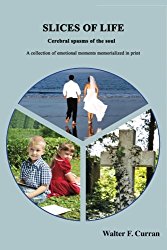- (0)
- 8
May -
Author : Walter F. Curran Category : Published Works, Short Stories
Tags : Fiction, Short Stories
Fiction – Rehoboth Beach Writer’s Guild, 2019 Anthology
The window. It’s still there. Still screaming. The gaping maw and the evil, cruel wink.
Part of a once protective wall, shielding us from wind and cold, it provided a perch to spy on the outside world, yet allowed the sun to peek inside, brightening the room and cheering us up. It was our room. Me and my big brother.
Dad worked hard, but no one made a lot of money back then. This was the first house we ever lived in. The owner, the eldest son of a farmer, fleeing the farm life, built the house a quarter mile off the beach, his true love. An unrequited love. He built the house but never lived in it. He and his father had gone off to war and never returned.
When the widow got the letter from the War Department, she screamed and fainted dead away. Found by her younger son, when she came to, she yelled, “You’re dead, you’re dead,” and kept pushing him away. He was the same age then as I am now. After a few months, she settled down, but always cringed at the sight of her younger son. One day, he left. No one knows where he went.
Ma met the widow who never stopped talking about her husband and older son. Not a word about the younger son. Ma told Dad, and he went to see the widow to ask if she would rent us the house. She agreed to let us live there, rent free. She said, “If you stay and take care of the place like my boy would have, I’ll deed you the place when I die.”
Ma wanted the house but she was superstitious. With Dad that night, she said, “This is a dead man’s house. Maybe it’s cursed.”
“Don’t be silly, girl. No such things as curses. Times are hard. Where else you gonna get a house for nothing but upkeep?”
So, we moved into the house. For two years, Dad worked in town at the lumber yard and did odd jobs for other folks and businesses in the town, a jack of all trades. My brother and I went to school, helped around the house and sometimes helped Dad on the bigger weekend jobs he got.
Every Saturday afternoon, the widow would come by and inspect the house. If Dad was there, she’d talk to him and my older brother but not me. She looked right through me as if I wasn’t there.
In June, the widow told Dad the roof needed replacing. Dad got the ladder out, climbed up and walked the length. When he got down, he said, “The flashing needs patching around the chimney but the rest of it looks good. I’ll get to it next week.”
“No!,My son said it needs replacing. All of it.”
Dad stared at her. “Ma’am, You all right?”
“Of course, I’m all right. This is my sons’ house, and he says it needs replacing, so replace it.”
“Yes Ma’am,” Dad replied, and she left.
Turning to Ma, Dad said, “The widow’s gone batty. Did you hear what she said? She’s talking to her dead son.”
“I told you there’s a curse on this house.”
“Stop that talk, girl!” It’s the first time I ever heard Dad speak harsh to Ma. “She’s getting on in age and getting a little daft. It’s no never-mind, anyway. This is still her house and we live here free. If she wants a new roof, I’ll give her a new roof.”
Dad decided he’d just overlay the old shingles but replace the flashing around the chimney first. We needed nine squares and were faced with wrestling twenty-seven packs onto the roof. Standing, craning his neck, Dad said, “Get the long ladder. We’ll bring the shingles up to the roof from the rear of the house.”
Twenty feet high, the back wall, the window wall, overlooked a stone berm keeping the creek from eroding the bank. There was eight feet of flat ground from the house to the top of the berm then another fifteen feet slanting down to the creek bottom. The bottom was always soft and muddy.
Still and all, the foot of the ladder rested six feet away from the house reaching twenty-four feet high so it was steep. To keep the feet of the ladder from slipping, Dad lay a two by four behind the feet and drove two tent pegs into the ground to hold the board in place. The top of the ladder extended three feet above the roof line, adjacent to the window.
Dad took the flashing up followed by my brother with the first bundle and I trailed with the second bundle, both of us tentative. On the ladder, every step is tenuous, as it bent and swayed, dancing in a narrow arc.
“Don’t look down.” The only admonition from Dad as he leaned over, shirtless in the summer sun. Farmer tan on his rock-hard arms and neck, sweat dripping on me as he spoke. “Look your way up. Feel your way down. Won’t get dizzy and you’ll go slower.”
When I got up there, Dad said, “Boys, this ain’t how it works.” Pointing at me, he said, “You stay below and carry the bundles from the side to the ladder. Your brother will take them up the ladder.”
“I can carry it up the ladder,” I protested.
“No doubt, but we do things my way…understood.”
“Yes, Dad,” and I slunk down the ladder followed by my brother. I expected him to tease me but all he said was, “Ain’t no arguing with Dad,” and slapped me on the shoulder.
Dad gave a lot of advice. If only I had listened better.
It only took Dad an hour to remove and replace the flashing. Brother and I lifted twelve of the bundles, spreading them along the peak of the roof. Then I sat and waited while Dad and my brother lay the shingles. By the time we stopped for lunch, they’d laid nine bundles, three whole squares.
After lunch, my brother and I were to hoist bundles again. With Dad hammering away on the roof, my brother said, “I got the trots. Be right back,” and ran into the house. After a few minutes, I heard Dad call, “Need some shingles.”
Noticing the pegs holding the board at the bottom of the ladder had been wiggling loose, I foot-stomped them back in place. Then I shouldered a bundle and worked my way up the ladder. Halfway, the wiggle in the ladder increased. Out of the side of my eye, I saw my brother come around the corner of the house. A few more rungs and I stopped. Five more rungs to go. My head was at the roof line.
“What are you doing, boy? I told you to stay down.”
Looking up, my Dad was at the top of the ladder, squatting. I took a step when the ladder lurched. The peg at the side furthest away from the window slipped out, and the ladder partly pivoted. I let go the bundle of shingles and grabbed at the ladder with my right hand. My left hand slipped, and I punched out the window pane in the top right corner, gashing the back of my hand. The bundle hit my brother in the head just as he looked up to see what was happening. It snapped his neck like a twig. I heard my Dad shout “No!”
Dad fell face first past me, grabbing at the ladder, upside down, holding on, his right foot kicking me, then the bottom of the window, smashing it. The ladder still shook and started to slide along the eave with me hanging on the house side of it. I pushed off the ladder, sending it away from the house, Dad still upside down on it, and grabbed for the window, getting my upper arms inside the broken pane. I scrambled through the window, leaving a trail of blood behind.
Down through the house, yelling, “Ma! Ma!” I ran around to the back. My brother lay with his head at a right angle to his shoulders, dead. I looked over the edge of the rock berm. Dad lay with his face in the creek, the ladder beside him. I jumped, landing next to him and rolled into the creek. Pulling him out of the creek, I turned him over. That’s when I heard her piercing scream. Ma’s scream. A widow’s scream.
I never told Ma about pushing the ladder away. No one knows, except me. I stayed for six months. Before I left, I walked around back and stared at the window. The window screamed at me and winked that evil wink. It still screams at me today. My father’s last word. NO!!!
The widow came every day. She and Ma would sit on the porch and stare. Maybe they saw their husbands and older sons. I no longer existed, for either of them.






